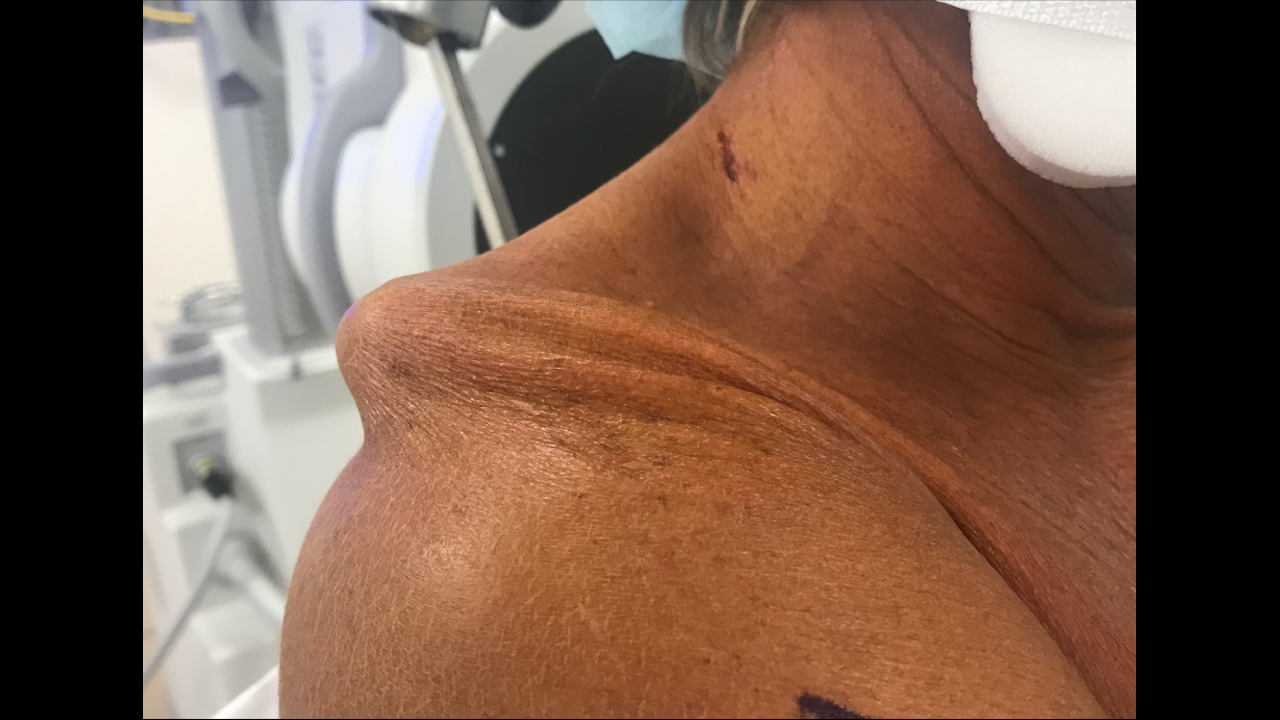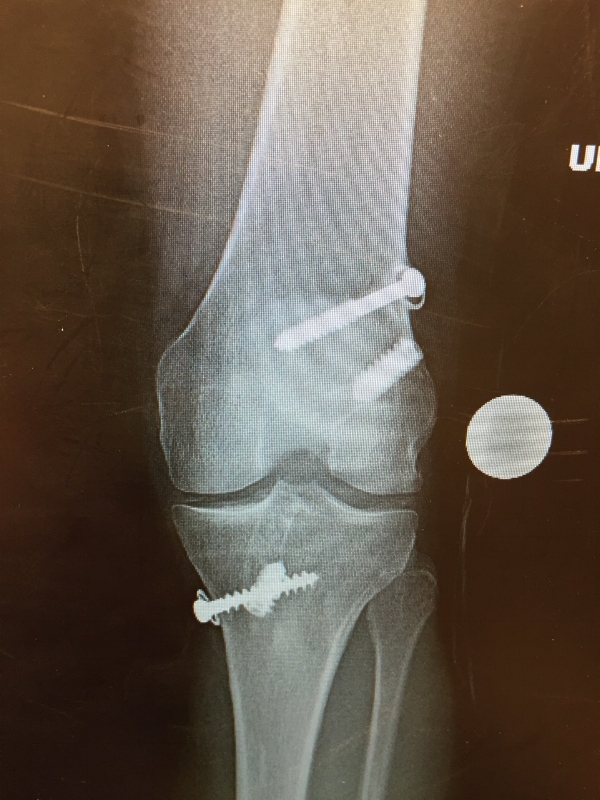Discipline- Tips on the road to injury recovery
Over 30 years of active athletics, I’ve had six surgeries. Not too bad for someone continually with her finger on the throttle. I like to “go for it,” but in the process I’ve taken some hard falls. I accept this as paying the price for being an adrenaline junkie. I’ve learned to love orthopedic surgeons because they continue to put me back together and, thankfully, my body is a good healer.
As we get older our body naturally stops producing muscle. Which means if we don’t work out, we atrophy or shrink. I recently had shoulder surgery and have been down for two months recovering. My doctor did a hamstring graft to fix my dislocated collarbone. Not only is my shoulder healing, so is my hamstring and glute. It’s important to allow our body the time it needs to heal and while doing so we watch it shrink. Rebuilding takes time and discipline. Here are some of my suggestions for recovering from an injury and/or surgery.
2017 Right AC seperation (pre surgery) fixed by Dr. Peter Millett - Vail, CO
Allow yourself time to heal.
Embrace the process and accept that you will be down for a while. Set up some projects that you have been putting off that will give you a sense of accomplishment. Plan ahead if you can and get organized. This always makes me feel better about being down. Some of my projects have included organizing my photos in my computer and backing up the files, getting my Christmas cards started, and doing some writing, like this blog. What has been on your to-do list since you wrote down your last New Year’s resolutions? Yes…that one thing you still haven’t done. Do it.
Have someone help you.
Post-surgery is tough and you will need assistance. It’s best to hire someone so you don’t feel like you’re imposing on friends or family. If you do impose, plan on doing something nice for that person and do it before they help you so you don’t feel guilty about being so needy. Be honest with that person and make sure they understand that their job is to aid you in recovery. It might seem silly, but extra bags of ice in the freezer (for you) and extra booze in the liquor cabinet or special treats (for them) will be a good way to show your appreciation.
Get yourself into Physical Therapy right away.
Do not put this off. Working with a professional in the first months is key. Passive range of motion (moving the limb without firing the muscle) is one of the most important things you can do. As your injury heals, the joint creates scar tissue and this tissue needs to be broken up. The longer you wait, the harder it will be to get full range of motion back. Keep in mind this is not a pain free process- but it’s worth it.
Orthopedic surgeries help put a skier's body back together, but it's up to you to help it heal. 1989 Right knee dislocation fixed by Dr. Steadman - South Lake Tahoe, CA
Get massages or do it yourself.
If you can afford a masseuse, you should have the joint and the areas around it rubbed on a regular basis. Massage breaks up scar tissue and the increased circulation moves old blood out of the area. It’s also great to massage your entire body since everything is connected. If you have a knee or leg injury you don’t need an expensive masseuse -- do it yourself. You will heal faster if you massage. When I think about all the money I spend on surgery and all the time I spend on rehab, a twice a week massage is no big deal and I’m worth it. Treat yourself!
Ice often.
Ice is the miracle drug, especially right after surgery or an injury. By icing several times a day you keep blood from rushing to the injured area, reducing swelling and pain. You always want to quicken the healing process, so get comfortable with regular cool downs. Once you are in the rebuilding phase it’s a good idea to ice after each workout.
Spin Bike is your friend.
A stationary bike is the first place you should be going for exercise. Spinning without resistance is good to get post-surgery toxins out of the system. Even with a leg injury, you can prop the bad leg up on a chair and spin lightly with the good leg. You will be amazed at how much better you’ll feel with just a little light exercise. As you get stronger, you can increase resistance. Doing this will keep you ahead of the game and keeps you from doing something stupid -- like falling down again.
2015 L3-L4 Spinal fusion fixed by Dr, Scott Leary - San Diego, CA
Stop drinking alcohol.
If you are a drinker, this is the right time to take a break. Booze is a toxin and our bodies need all the help they can get to heal. Drink lots of water and look into supplements that promote healing. It helps me to announce that I’m off the sauce which holds me accountable for my actions -- and to be disciplined while I work at getting back to 100%. I know it’s tough, but we all can use a break once in a while, right?
Keep your core strong.
Depending on your injury, you can almost always do some core exercises. Keeping the mid-section strong while healing will be so helpful once you start serious training and get back into your sport. Ask your physical therapist what you can do and then go do it! When I was recovering from Spinal fusion I was really limited in what I could do. But all the tedious core exercises I was assigned to do ended up making me much stronger than I had ever been. When I got on snow, I immediately knew I was stronger and a better skier because of it! And, who doesn’t want nice abs?
Stay Focused.
Major injuries can take over a year to completely heal, especially as we age. Be smart about your progress and try not to risk re-injury by jumping back into your favorite sport or overdoing it. This takes the most discipline. As I write this I’m watching my friends surf perfect glassy waves. My shoulder is strong enough to paddle and surf but it’s not strong enough to handle any yanking or impact. I have to tell myself “no” and keep my eye on the big picture.
2015: I have come back from every surgery more fit, stronger and healthier than I was before.
Build your confidence through strength.
Getting back into your sport after an injury is intimidating. In the back of your mind is always the thought of re-injury. This is perfectly natural and should be expected. What has helped me in the past is knowing that I am strong, and that I have done everything I can to bring back that broken part. In the case of a knee injury or knee replacement, my suggestion is to measure the circumference of your leg before surgery. Your goal is to get the repaired leg back to the same size it was before surgery or at least the same size as the uninjured leg. Knowing you are strong is the best path to confidence. If you’re not there yet its okay; it took me two years to get my knee back after ACL/MCL surgery. So I backed off the first season on snow, not taking any chances and continued to build strength for another year. Two years after my surgery I won my first World Extreme Skiing Championships in Alaska. The thought of injury never entered my mind; I knew I had done the work.
Hopefully you won’t need any of these tips, but if you are recovering from an injury, then I wish you the best of luck getting back on top of your game. Remember to be good to yourself and sometimes being good means being tough and disciplined! The comeback is rewarding when you do it right. If you have questions, don’t hesitate to reach out! kim@skiwithkim.com
Special Thanks to:
Dr. Peter Millett – Shoulder specialist: http://drmillett.com/
Dr. Richard Steadman - Knee specialist: https://www.thesteadmanclinic.com/our-doctors/j-richard-steadman
Dr. Scott Leary - Neurosurgeon: http://www.drscottleary.com/




